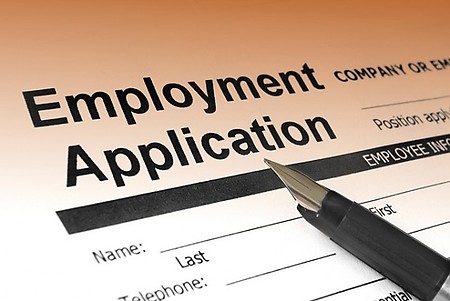News21st July 2015
Over half of disabled jobseekers find application stage challenging
Mirroring the experience of many deaf applicants, research identifies the barriers Deaf people face in the jobs market

When Deaf people apply for jobs, it is rare for the process to go smoothly or for them to secure an equal chance at getting the job. Facing ignorance, lack of knowledge and understand, discrimination or just plain laziness during the process, Deaf applicants have a raw time when trying to secure work. It is not surprising to learn from recent research, that the same barriers exist for a wide range of people with a disability.
 With the Government seeking to throw disabled people off benefits and getting them into work, you would hope the jobs market would be well placed to properly accommodate disabled applicants. Sadly, that is not the case. Some of the examples shared with the magazine, and in the examples detailed below, having a disability often leads to a door being shut firmly in your face. According to some comments below, the position is improving, but that is not the talk in the Deaf circles I am involved in.
With the Government seeking to throw disabled people off benefits and getting them into work, you would hope the jobs market would be well placed to properly accommodate disabled applicants. Sadly, that is not the case. Some of the examples shared with the magazine, and in the examples detailed below, having a disability often leads to a door being shut firmly in your face. According to some comments below, the position is improving, but that is not the talk in the Deaf circles I am involved in.
 Hopefully, at some stage, recruiters and employers will start to see us for what we can do, not what they think we can’t, with knowledge of Access to Work central to that thinking. With the right attitude and using technology and the support that is available to overcome any gaps, Deaf people can add great value to the workplace. In some jobs, there are actually examples in other parts of the world which prove, deaf people do the jobs better!
Hopefully, at some stage, recruiters and employers will start to see us for what we can do, not what they think we can’t, with knowledge of Access to Work central to that thinking. With the right attitude and using technology and the support that is available to overcome any gaps, Deaf people can add great value to the workplace. In some jobs, there are actually examples in other parts of the world which prove, deaf people do the jobs better!
The research findings are detailed below:
Over half of disabled jobseekers find application stage challenging
 Up to 85% of disabled people find that their condition has an impact when job-hunting, according to new research from the Recruitment Industry Disability Initiative (RIDI). Furthermore, 56% of respondents said that they first faced barriers as early as the application stage of the recruitment process - and only 3% of those surveyed said that their disability did not impact their job hunt at all.
Up to 85% of disabled people find that their condition has an impact when job-hunting, according to new research from the Recruitment Industry Disability Initiative (RIDI). Furthermore, 56% of respondents said that they first faced barriers as early as the application stage of the recruitment process - and only 3% of those surveyed said that their disability did not impact their job hunt at all.
RIDI, in conjunction with Diversityjobs.co.uk and Evenbreak, surveyed over 300 disabled jobseekers with a variety of physical and non-visible disabilities and long-term conditions. Almost 47% of respondents considered themselves to have a mobility impairment, 10% had a visual impairment, 13% identified as having a learning disability and 23% said they had a mental health condition.
Application stage is barrier to talent
Irrespective of disability, over half of respondents (56%) found the first hurdle – the application stage - challenging.
 One commented; “Many jobs I have been to seem to require a full driving licence. Due to the nature of my health condition and poor joints I am unable to drive so do not hold one. I have been refused interviews because of this despite my husband being able to drive and we have a blue disabled parking badge.”
One commented; “Many jobs I have been to seem to require a full driving licence. Due to the nature of my health condition and poor joints I am unable to drive so do not hold one. I have been refused interviews because of this despite my husband being able to drive and we have a blue disabled parking badge.”
Similarly, another said; “When an agency contacts me asking for my phone number after reading my CV, I explain to them that I cannot use the telephone and suggest corresponding via emails. Silence. No more response.”
Face-to-face interviews hurdle to employment
The face-to-face interview stage is also deemed to be a challenging time, with 57% of respondents saying that meeting a potential employer in person has impacted their chances of finding a job.
 “I have a hearing dog.” One respondent commented, “When they [interviewers] see her, they don’t want to know”.
“I have a hearing dog.” One respondent commented, “When they [interviewers] see her, they don’t want to know”.
Another revealed, “Interview with a major employer and the first comment was ‘you know you only got an interview because you ticked a disability box’.”
A third commented, “Once I go into interview the first thing they notice is my age and then my Bell’s palsy then the rest of the interview is pointless”.
 In addition to these key hurdles, the survey found that challenges are scattered throughout the recruitment process, with a proportion of respondents citing telephone interviews (23%), online assessments (32%), travel to an interview (29%), presentations (15%), psychometric testing (11%), role-play (15%), and group exercises (18%) as impacting their job hunt.
In addition to these key hurdles, the survey found that challenges are scattered throughout the recruitment process, with a proportion of respondents citing telephone interviews (23%), online assessments (32%), travel to an interview (29%), presentations (15%), psychometric testing (11%), role-play (15%), and group exercises (18%) as impacting their job hunt.
RIDI promotes the idea that small changes in recruitment processes can have a huge impact on inclusion and advises companies on ways in which they can drive change. Commenting on the survey results, Kate Headley, Director of Consulting at diversity consultancy The Clear Company and spokesperson for RIDI said:
“Sadly, it’s unsurprising that many disabled candidates find the recruitment processes challenging. Many recruiters and employers – most often unintentionally - are still using outdated processes, which are a disadvantage to those with both physical and non-visible impairments. In order to tap into disabled talent pools, employers and recruiters must get back to basics and review each stage of the recruitment process - from application stage to on-boarding - to ensure that they are accessible and equitable for all. If they fail to do so, the best person for the job may never even apply for the role – let alone make it to interview.
Morgan Lobb CEO and Founder at DiversityJobs.co.uk, which distributed the survey on behalf of RIDI, commented:
 “The findings of this survey are reflective of what our candidates have long been telling us – that there are a myriad of obstacles throughout the recruitment process that they must navigate in order to secure a role. The application stage in particular can be a barrier for jobseekers who do not fit all the criteria deemed ‘essential’ – such as holding a full UK driving licence. The employers that we work with understand that small changes in the way they communicate with disabled candidates can make a big difference to accessibility”.
“The findings of this survey are reflective of what our candidates have long been telling us – that there are a myriad of obstacles throughout the recruitment process that they must navigate in order to secure a role. The application stage in particular can be a barrier for jobseekers who do not fit all the criteria deemed ‘essential’ – such as holding a full UK driving licence. The employers that we work with understand that small changes in the way they communicate with disabled candidates can make a big difference to accessibility”.
Jane Hatton, Director at specialist job board Evenbreak, which also distributed the survey, said:
“As the only not-for-profit job board run by disabled people for disabled people in the UK, we understand that interviews in particular can be a daunting prospect for candidates who consider themselves to have a disability. As this research has highlighted, some interviewers can make jobseekers feel less than confident when meeting. This is largely due to a lack of awareness and experience of dealing with disability, but the tide is beginning to change. It’s encouraging to see that many employers, such as those that we work with, are taking steps to become more confident in engaging with disabled talent. And I have no doubt that those that do will reap the benefits.”
Article by Sarah Lawrence, Editor
posted in Community / News
21st July 2015





